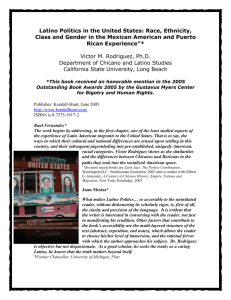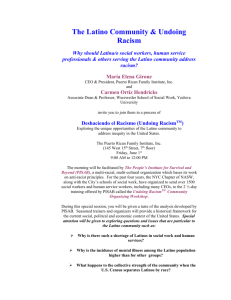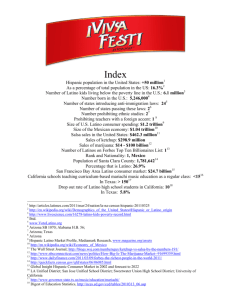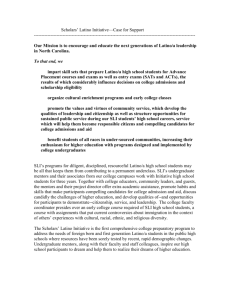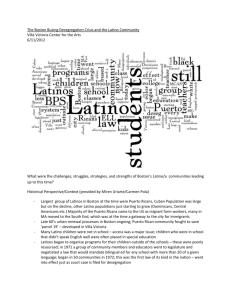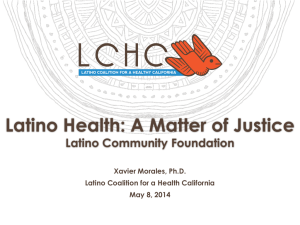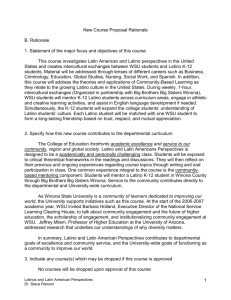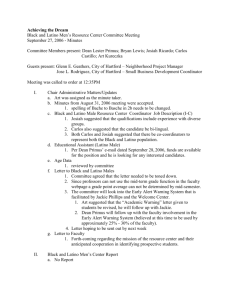Course Syllabus - Winona State University
advertisement
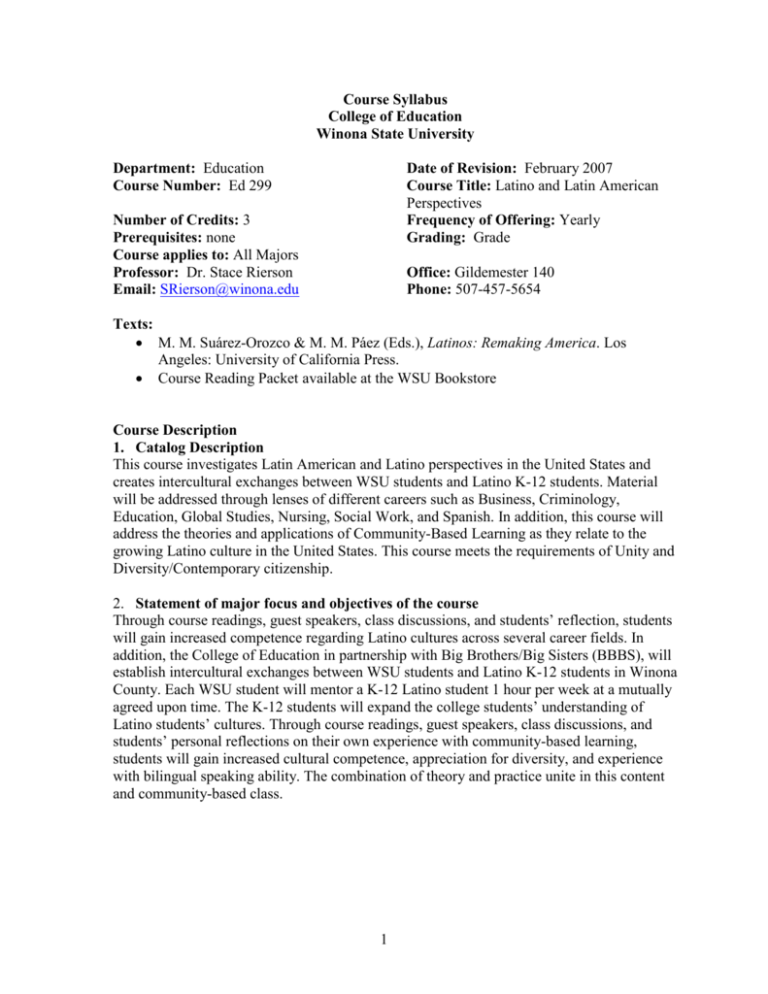
Course Syllabus College of Education Winona State University Department: Education Course Number: Ed 299 Date of Revision: February 2007 Course Title: Latino and Latin American Perspectives Frequency of Offering: Yearly Grading: Grade Number of Credits: 3 Prerequisites: none Course applies to: All Majors Professor: Dr. Stace Rierson Email: SRierson@winona.edu Office: Gildemester 140 Phone: 507-457-5654 Texts: M. M. Suárez-Orozco & M. M. Páez (Eds.), Latinos: Remaking America. Los Angeles: University of California Press. Course Reading Packet available at the WSU Bookstore Course Description 1. Catalog Description This course investigates Latin American and Latino perspectives in the United States and creates intercultural exchanges between WSU students and Latino K-12 students. Material will be addressed through lenses of different careers such as Business, Criminology, Education, Global Studies, Nursing, Social Work, and Spanish. In addition, this course will address the theories and applications of Community-Based Learning as they relate to the growing Latino culture in the United States. This course meets the requirements of Unity and Diversity/Contemporary citizenship. 2. Statement of major focus and objectives of the course Through course readings, guest speakers, class discussions, and students’ reflection, students will gain increased competence regarding Latino cultures across several career fields. In addition, the College of Education in partnership with Big Brothers/Big Sisters (BBBS), will establish intercultural exchanges between WSU students and Latino K-12 students in Winona County. Each WSU student will mentor a K-12 Latino student 1 hour per week at a mutually agreed upon time. The K-12 students will expand the college students’ understanding of Latino students’ cultures. Through course readings, guest speakers, class discussions, and students’ personal reflections on their own experience with community-based learning, students will gain increased cultural competence, appreciation for diversity, and experience with bilingual speaking ability. The combination of theory and practice unite in this content and community-based class. 1 3. Course outline of the major topics Major topics to be covered include Latino cultures, Latino identities, Critical Race Theory, Latino Critical Theory, Community-Based Learning, and perspectives from fields including but not limited to Business, Criminology, Education, Global Studies, Nursing, Social Work, and Spanish. 4. Basic instructional plan and teaching methods utilized A variety of instructional methods will be used including: a. class discussion of reading assignments b. guest speakers c. media presentations d. lecture/questioning e. collaborative learning activities f. mentoring experiences through BBBS 5. Course Requirements a. active oral participation in classroom discussions b. assigned readings c. written personal reflections d. final “Synthesis and Catalyst” Paper that addresses or responds to a current need in the student’s major field. 6. Academic dishonesty policy: Academic dishonesty will not be tolerated and disciplinary measures will be enforced according to school policy. The first offense will result in an F on the project in question, and a subsequent infraction will result in a failing grade for the course (or worse). 7. Grading The final grade will be comprised of the following elements: Attendance, class preparation and participation Written reflections of experience with community-based service (Minimum 1 page or 280 words per week) Midterm Assessment at Week 7 Oral Presentation of Final Project Written Presentation of Final Project Grade Scale: A 100-93% B 92-83% C 82-73% D 72-63% F 62-0% Note to students with Disabilities: If you have special needs related to a disability which may affect your performance in this course, please arrange an appointment as soon as possible to discuss your needs privately. 2 COURSE STANDARDS AND POLICES 1. Class preparation: Students are expected to have read and be ready to discuss the assigned readings for each class meeting. 2. Attendance, active participation, and homework: Attendance is expected and required. Participation will be graded. Homework will consist of brief note-taking assignments on the readings, online (D2L) submissions of reactions to the readings, and reviews of and reactions to peers’ work. 3. Late work: All assignments will be reduced one grade for every day late. 4. Written reflections Students will share written reflections of their community-based service (Minimum 1 page or 280 words per week) with the course professor periodically throughout the semester. Students will be encouraged to orally discuss their experiences with peers during class sessions every 3 weeks. 5. Midterm A written midterm at the end of week 7 will assess students’ cognitive progress regarding community based learning and Latino theoretical methodologies. 6. Final Project: (10 page minimum “Synthesis and Catalyst” Paper) Students will synthesize their mentoring experiences and course readings into a relevant project for their declared major, These final projects will be determined by each student and the course professor. For example, students in criminology may investigate racial bias in court rulings and how Latino criminals are treated differently than criminals from other ethnicities. Nursing students may investigate a community based health need, and develop a plan of action. Education students may develop culturally relevant lesson plans for their future students. 7. Oral presentations: Students will make a brief (5 minute) oral presentation as part of the final exam assessment. They will present to the class what they synthezied from their experiences, and what they have generated to highlight awareness or create social change in area Latino communities. 3 Course Calendar Fall 2007 * Discretionary changes may be made to the syllabus by the professor when deemed appropriate. Week 1 (Week of August 27) 1. Course introduction and expectations for Mentoring 2. Introduction to the Latino Community Discussed Reading: Suarez: p. 1-37 Introduction 3. Introduction to Community Based Learning Guest Speaker: Tammy Swenson-Lepper from Communication Arts to talk on Community based practice Discussed Reading: Campus Compact Essential Resources (2004) Week 2 (Week of September 3) 1. Mentoring in Winona County Guest Speaker Jamie Groth, Executive Director of Big Brothers Big Sisters Winona Discussed Reading: Pope, M. L. (2002). Community college mentoring: Minority student perception. Community College Review, 30(3), 31-45. 2. An introduction to Critical Race Theory and Latino Critical Theory: How these theories relate to your mentoring experiences Discussed Reading: Baber, C. R. (2003). From liberal teacher to liberated teacher: A reflection on my journey through the profession. In G. Ladson-Billings (Ed.), Critical race theory: Perspectives on social studies (pp. 45-68). Greenwich, CT: Information Age Publishing. 3. An introduction to Critical Race Theory and Latino Critical Theory: How these theories relate to your mentoring experiences Discussed Reading: Crenshaw, K., Gotanda, N., Peller, G., & Thomas, K. (Eds.). (1995). Critical race theory: The key writings that formed the movement. New York: New Press. Week 3 (Week of September 10) 1. Social Services and the Latino population Guest Speaker Arlen Carey from Social Work Dept. 4 2. Review major topics from previous weeks’ content and guest speakers 3. Open Discussion of weeks 1-3 Mentoring Experiences with Written Reflections Week 4 (Week of September 17) 1. Racial Topics in the United States Guest Speaker Linda D’Amico from Global Studies Dept. Discussed Reading: Darder, A. (Ed.). (1995). Culture and difference: Critical perspectives. Westport, CT: Bergin and Garvey. 2. Racial Topics in the United States Discussed Reading: Delgado, R. (1998). The Black/White binary: How does it work? In R. Delgado & J. Stefancic (Eds.), The Latino/a condition: A critical reader (pp. 369-375). New York: New York University Press. 3. Racial Topics in the United States Guest Speaker Peter Henderson from History Dept. Discussed Reading: Bodnar, J. (1994). Remaking America: Public memory, commemoration, and patriotismin the twentieth century. Princeton: University Press. Week 5 (Week of September 24) 1. Racial Topics in the United States Guest Speaker from Criminology Dept (TBD) Discussed Reading: Crenshaw, K. (1993). Beyond racism and misogyny: Black feminism and 2 Live Crew. In M. Matsuda, C. Lawrence, & R. Delgado (Eds.), Words that wound: Critical race theory, assaulting speech, and the First Amendment (pp. 111-132). Boulder: Westview Press. Delgado, R. (Ed.). (1995a). Critical race theory: The cutting edge. Philadelphia: Temple University Press. Farber, D. A., & Sherry, S. (1995). Telling stories out of school: an essay on legal narratives. In R. Delgado (Ed.), Critical race theory: The cutting edge (pp. 283-292). Philadelphia: Temple University Press. 2. Responses to new immgrants in the US Guest Speaker from Centro Campesino in Owatonna: Discussed Reading: Discussed Reading: Suarez, pp. 165-189 Ambivalent Reception: Mass public responses to the “New Latino Immigrantion to the United States 5 3. Open Discussion of weeks 4-5 Mentoring Experiences with Written Reflections Week 6 (Week of October 1) 1. Discuss Student Presentation assignment and peer review process 2. Gender, Race, and Community based learning Discussed Reading: Suarez, pp. 110-125 3. Community Based Learning: The impact of mentoring on the retention of students in K-12 schools Discussed Reading: Freire, P. (Ed.) (1997). Mentoring the mentor: A critical dialogue with Paulo Freire. New York: Peter Lang. Week 7 (Week of October 8) 1. Latino Literature Guest Speaker Vanessa Greene from Spanish dept Discussed Reading: Candelaria, C. (1986). Chicano poetry: A critical introduction. Westport: Greenwood Press. 2. Latino Literature Discussed Reading: Anzaldúa, G. (1987/1999). Borderlands/La Frontera. San Francisco: Aunt Lute Books. 3. Midterm assessment: reflection on personal goals Week 8 (Week of October 15) 1. Latino Empowerment in Minnesota Guest Speaker from Latinos Unidos in St. Charles Discussed Reading: Burris, V., & Diamond, S. (1992). Academic freedom, conspicuous benevolence, and the National Association of Scholars. Critical Sociology, 3, 125-42. 2. Community Based Learning 6 Discussed Reading: The impact of mentoring on culturally and linguistically diverse students Discussed Reading: Suarez pp. 306-320 Bilingual Infants: Mapping the research agenda 3. Open Discussion of weeks 6-8 Mentoring Experiences with Written Reflections Week 9 (Week of October 22) 1. Latinos and Access to Healthcare in the US: How does this affect our students? Guest Speaker from Nursing Dept (TBD) Discussed Reading: Bloomberg, L., Ganey, A., Alba, V., Quintero, G., & Alvarez Alcantara, L. (2003, May/June, Supplement 1). Chicano-Latino youth leadership institute: An asset-based program for youth. American Journal of Health Behavior, 27, s45-s54. 2. Latinos and Access to Healthcare in the US: How does this affect our students? Discussed Reading: Hayes-Bautista, D. (2002). The Latino Health research agenda for the 21st Century Introduction: The research agenda. In M. M. Suárez-Orozco & M. M. Páez (Eds.), Latinos: Remaking America (pp. 215-235). Berkeley and Los Angeles: University of California Press. Brown, E. R., & Yu, H. (2002). Latino’s access to employment based health insurance. In M. M. Suárez-Orozco & M. M. Páez (Eds.), Latinos: Remaking America (pp. 236-253). Berkeley and Los Angeles: University of California Press. 3. Film: Race, the power of an illusion (Part I) Week 10 (Week of October 29) 1. Film: Race, the power of an illusion (Part II) 2. In class discussion of video, Race the Power of an Illusion; complete written reflection 3. Open Discussion of weeks 9-10 Mentoring Experiences with Written Reflections Week 11 (Week of November 5) 1. Preparing Latino students for their futures: Latino students’ needs Discussed Reading: Darder, A., & Upshur, C. C. (1993). What do Latino children need to succeed in school? Prado-Olmos, P. L., & Marquez, P. (2001). Ethnographic studies of Exito Para Todos. In R. E. Slavin & M. Calderón (Eds.), Effective programs for Latino students (pp. 231-250). Mahwah, NJ: Lawrence Erlbaum Associates, Inc. 7 2. Preparing Latino students for their futures: The impact of mentoring on successful K-16 graduation rates Discussed Reading: Excerpts from Bartolomé, L. I., & Balderrama, M. V. (2001). The need for educators with political and ideological clarity: Providing our children with “the best.” In M. de la Luz Reyes, & J. J. Halcón (Eds.), The best for our children: Critical perspectives on literacy for Latino students (pp. 48-66). New York: Teachers College Press. 2. Preparing Latino students for their futures: The impact of mentoring on drug use and violence. Discussed Reading: Levin, M. (1998). Teach me! Kids will learn when oppression is the lesson. New York: Monthly Review Press. Week 12 (Week of November 12) 1. Latino Empowerment: Guest Speaker Fatima Said from Project FINE Discussed Reading: Excerpts from Darder, A, Torres, R. D., & Gutierrez, H. (Eds.). (1997). Latinos and education: A critical reader. New York: Routledge. 3. Latino Empowerment: Guest Speaker from Latinos Unidos Discussed Reading: Suarez, pp. 75-96 Power and Identity: Miami Cubans 4. Open Discussion of weeks 11-12 Mentoring Experiences with Written Reflections Week 13 (Week of November 19) (Thanksgiving week) 1. Latino students: what generates success? Discussed Reading: A study of four Boston Public Schools. In R. Rivera & S. Nieto (Eds.), The education of Latino students in Massachusetts: Issues, research, and policy implications (pp. 127146). Boston: University of Massachusetts Press. Week 14 (Week of November 26) 1. Race and Education Guest Speaker Maudie Williams from Education dept. Discussed Reading: 8 Branch, A. (2003). A look at race in the national standards for the social studies: Another bad check. In G. Ladson-Billings (Ed.), Critical race theory: Perspectives on social studies (pp. 99-120). Greenwich, CT: Information Age Publishing. 2. Race and Education: Have conditions improved since the Civil Rights era? Discussed Readings: Ginsberg, M. (1988). Contradiction in teacher education and society: A critical analysis. New York: Falmer Press. 3. Open Discussion of Semester Mentoring Experiences with Written Reflections Week 15 (Week of December 3) 1. Continuing the Mentoring Process Guest Speaker Jamie Groth from BBBS 2. Wrapping up the semester: from Critical Theory onward. 3. Course evaluation Final Exam: Final Project due with oral presentation to class 9
